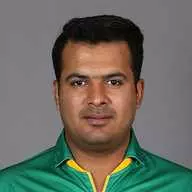Sharjeel Khan is a Pakistani left-handed batsman. He was born in Hyderabad, Pakistan, and is an attacking opening batsman. Sharjeel, who was born on August 14, 1989, is also a part-time slow leg break bowler.
Background
In 2009, Sharjeel Khan made his first-class debut, scoring just one run in his first innings.
He only hit 8 home runs during that season. In Pakistan’s domestic rivalry, however, he made a name for himself by scoring two T20 centuries.
International Debut
Sharjeel was called up for Pakistan’s ODI squad during Sri Lanka’s tour of the United Arab Emirates in 2013. He scored a promising 34 runs in his second match and a quickfire 50 runs in just 25 balls in his third match.
Sharjeel won his first test match against New Zealand in September 2016 after impressing in limited overs matches against England and the West Indies.
Rise to Glory
In 2016, Sharjeel scored his first international century against Ireland. He amassed a total of 152 laps. With a strike rate of 176.74, he scored fifty in 34 deliveries and a century in 61 deliveries.
With this century, Sharjeel passed Saeed Anwar and Imran Nazir as Pakistan’s third-highest run scorer in an ODI innings. After AB de Villiers and Shane Watson, his 150 is the third-fastest of all time.
Club Career
Sharjeel was a part of Islamabad United’s squad in the Pakistan Super League (PSL) 2016. In a game against Peshawar Zalmi, which is recognised for having the best bowling line-up in the PSL, he scored 117 from 62 balls.
He ended the tournament as the third-leading run scorer, behind Umar Akmal and Ravi Bopara, with 300 runs scored at an outstanding strike rate of 149.25.
Controversy
Sharjeel Khan, along with teammate Khalid Latif, was officially fined by the Pakistan Cricket Board for breaching the anti-corruption code during the 2017 edition of the Pakistan Super League.
Khan was temporarily arrested under the PCB’s Anti-Corruption Code. Sharjeel Khan was barred from all aspects of cricket for five years on August 30, 2017, after being found guilty of violating the PCB’s anti-corruption law.
